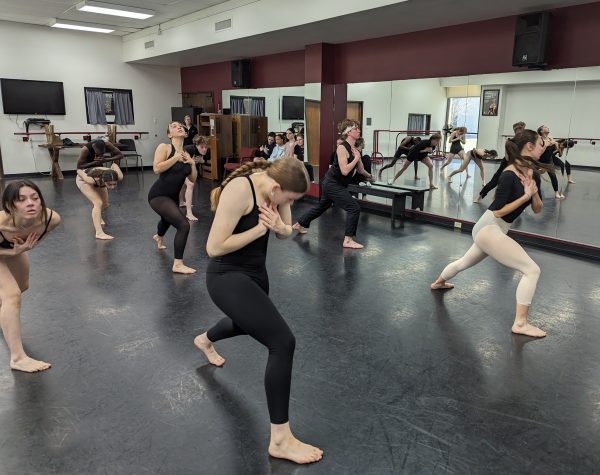Inflation’s effect on college students
Inflation has been fluctuating and significantly affecting people throughout the past couple of years, specifically college students. While the government had assisted during the COVID-19 pandemic, the assistance stopped over a year ago. Due to the increased cost of the standards of living, college students are affected more than they think.
Inflation is known as the rise in prices which can be translated as a decline in purchasing power over time. Inflation is concerning, especially for economists, as it destabilizes the economy, where investment and consumption decisions are harmed by volatile pricing.
“Inflation is generally considered to be a bad thing as it lowers purchasing power and serves as a tax on the wealth of most people,” Dr. Neil Terry, Executive Vice President and Provost & Paul Engler Professor of Economics said. “Of course, someone with negative wealth might benefit from inflation as debt can be paid off in cheaper dollars.”
The United States economy can absorb inflation of 3% or lower without any problems. However, a rate of 6.5% to 10% is significantly high and makes it difficult for consumers to maintain the power of buying goods concerning prices escalating.
“It [why inflation increases and decreases] is a function of the money supply relative to production,” Dr. Terry said. “Too much money chasing too few products causes inflation, while a flood of products relative to the money supply will result in deflation.”
College paths differ between students, but there are a few common paths followed. For instance, some students choose the dorm life and have it paid through loans, scholarships or family; while others live off-campus and continue to receive assistance from loans and family or work to pay their bills.
“I love living off-campus. It is an environment away from some of the stress that comes from school and has been a sanctuary for me,” McKenna Cooper, junior music therapy major said. “I do believe that living on campus allows you to be more immersed within the community, but I lived in the dorms for two years and was ready to have a place of my own.”
Cooper works at Information Technology services on campus but has to stay on top of covering bills. . Although Cooper finds living off-campus cheaper than living in the dorms, it has made life as an adult more stressful.
“I’ve definitely had to stay on top of work shifts and get the hours that I need to pay rent,” Cooper said. “Rising costs have made it all the more difficult to have any time for rest. It’s school, work, study and repeat. The additional cost has been extremely stressful. Mainly in the times when life is out of my control when rehearsal, studying or illness gets in the way of making it to work.”
Despite challenges and stress, Cooper prefers living off-campus . She believes it would be beneficial if West Texas A&M University offered an off -campus scholarship in the student’s best interests.
“For a typical college student, inflation is both bad and good,” Dr. Terry said. “On the bad side, college students tend to have a tight budget constraint, and present-day higher prices restrict purchasing options. In short, the financial aspect is already a challenge for many college students – hence, higher prices at the gas station, grocery store and other outlets makes it increasingly difficult to provide the basics of food, shelter, and clothing while in college.”
Inflation is affecting college students more than they realize. College Board has been tracking how universities have increased the costs of tuition, housing, meal plans, on-campus necessities and mandated fees. On-campus may seem cheaper, but rising costs makes it more expensive than living off- campus.
“On the positive side, inflation tends to result in higher wages across many jobs eventually; hence, some college students will eventually benefit from inflation as they move into a job market with more robust salaries,” Dr. Terry said. “College students with automobile and credit card debt might also benefit with a long-run ability to pay off accrued liabilities in devalued dollars. Overall, college students are more likely to obtain long-run benefits from inflation compared to the general population.”
Inflation offers some benefits. While these benefits may take time to be noticeable, there are ways to help yourself through inflation..
1. Apply for a job. Off-campus jobs tend to pay more than on-campus, but any source of income will help you afford everyday expenses.
2. Submit the FAFSA every year as soon as possible. On Oct. 1 each year, the FAFSA is available and the sooner you complete it, the more likely you are to earn money. These funds can go towards your tuition; if you are fortunate enough to have extra, it becomes pocket cash for your other expenses. Submitting the form earlier tends to give you more money.
3. Apply for scholarships. Whether you have student loans or pay your tuition in full each year, receiving scholarships will save you money now and in the long run.
4. Sign up for student discounts. Many food places, entertainment services, clothing stores, grocery stores and traveling companies provide college student discounts by simply confirming through your student email.
5. Look into your expenses. It is always a great idea and resource to use a budgeting app. Taking a look at your bills and income will allow you to visualize your spending and create a way to pay your bills, put some of your income towards miscellaneous for your pleasure and build savings.
Considering it is already difficult to afford things as a college student, inflation is an unfortunate part of life and affects everyone. Fortunately, economists suspect this period of inflation could end by the middle of 2023. While our society waits for prices to lower and inflation to decrease, understanding inflation and following these tips can make living easier.

Hi everyone! My name is Kaelin Collar, and I'm a sophomore majoring in biology on a pre-medical track from Oregon. I've been with The Prairie News for...














